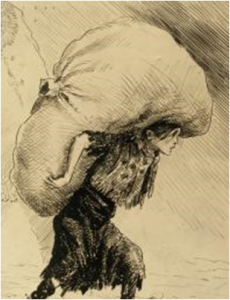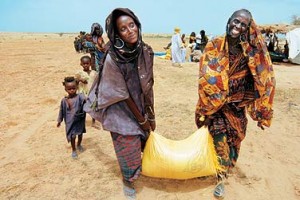Luke 24:13-35
(Before the service at St. Philip’s, I was introduced to the congregation as a former missionary in Haiti. I also had gotten lost on the way to church, and had to ask for help getting there.)
Before I served as a missionary in Haiti, I served in Sudan, in the Diocese of Renk, for four years. While I was there, I lived on the border between the North and South, on the border between Arabs and blacks, on the border between Muslims and Christians. It was a very tense time, because the civil war had just ended and they were beginning their movement toward independence, which happens on July 9 of this year.
four years. While I was there, I lived on the border between the North and South, on the border between Arabs and blacks, on the border between Muslims and Christians. It was a very tense time, because the civil war had just ended and they were beginning their movement toward independence, which happens on July 9 of this year.
Where I lived, we liked to refer to as “beyond the back of beyond.” That’s how far away it was. It was 250 miles south of Khartoum on the White Nile River. It was 250 miles to the next white person, and it was 250 miles from chocolate ice cream. If I wanted chocolate ice cream, I had to go on the terrible roads up to Khartoum, but to do so, I had to pass through up to 50 military checkpoints, with a bunch of people who didn’t like me. They didn’t like me because in Sudan, I had five strikes against me before I even opened my mouth. I was a white, female, Christian, American priest. At every checkpoint, there would be somebody who had an issue with one of those five.
So I would stay in Renk – after I would fly into Khartoum, I would go down to Renk, and I would stay there and not go back and forth to Khartoum because it just got to be too dangerous. It was not just dangerous for me; it was dangerous for the Church in Sudan, because the government in Khartoum – the government – is a fundamentalist, Islamic government, and was actually friends with the late Osama bin Laden. They had real issues with Americans, and they did not like Christians, and they were not impressed with white, female, American priests. What the government would do is check up on me, and through checking up on me, it would spy on the Church, because the government in Khartoum despises Christians and it despises the Episcopal Church of Sudan, which is the fastest growing portion of the Anglican Communion in the world.
I was there for three months and then I got thrown out because the government likes to play these games. Then I received permission to come back and when I got back, I got what is called my “residency visa,” which made me fully subject to all the laws of Sudan. Being an American wasn’t worth spit. And it made life even more difficult for all of us, so I stayed for six more months, then came back to this country for some work, and then went back to Sudan.
I had been there long enough that there were days when it was difficult. There were days when I wanted to know whose stupid idea this was, for me to move to Sudan. (Mine.)
And then April came. April is truly the cruelest month in Sudan. It’s 140 degrees every day. We were living on the edge of the Sahara Desert. We had a gallon of water per day in which to bathe. I had to filter every drop of water that I drank or it would kill me, because it came out of the While Nile, which is filthy. There was no electricity. There were no fans. I taught under a tin roof. And I reached a point where my faith began to waver some.
I didn’t lose faith in God.
I didn’t lose faith in Jesus Christ.
What I lost faith in was my call, and whether I actually belonged there in Sudan.
And so I wrote an e-mail to a friend of mine.
Now because we had electricity on a very sporadic basis, and because the Internet was just beginning to spread over Sudan, there were days when nothing would go out over the Internet. It could take weeks for an email to go out. I had a friend who wrote to me every day and I would write a message to her.
Now … I would write them, but they wouldn’t go anywhere. One of the emails I wrote to her was actually 32 printed pages long. Every day, I would say, “Well, the Internet’s not working, but let me tell you about today.” In that 32-page-long document, I wrote to her and I said, “I am not certain what I’m doing here any more. I am not certain that this is what I’m called to do. This is hard. And we’ve had nothing setbacks. Even though we have a peace agreement, we do not have peace. It’s really, really difficult right now.”
My friend, God bless her, wrote back to me (and I have to quote this, because I get this quote wrong all the time), she sent back to me a quote from a U2 song – y’all know U2, the band, and Bono, its leader? – that’s called Walk on, walk on.
All my friend sent to me was the song’s refrain:
“Walk on, walk on …
“You are packing a bag for a place none of us has been
“A place that has to be believed to be seen.”[1]
You are packing a bag for a place none of us has been,
A place that has to be believed to be seen.
 That song could be theme song for this morning’s Gospel from Luke, the story of the two people on the road to Emmaus. They are walking along, having left Jerusalem. Now remember, this is the third day. They have been followers of Jesus. They have seen Jesus perform miracles. They saw him feed the 5,000 – heck, they helped Jesus feed the 5,000. They have seen him cure people, restore sight to the blind, and hearing to the deaf, and speech to the mute. They have seen the lame leap for joy. They have experienced the love and the joy and the hope of this man, whom they were convinced was the Messiah, and then … then he was arrested. He was beaten. And tortured. And crucified. And they laid his body in the tomb.
That song could be theme song for this morning’s Gospel from Luke, the story of the two people on the road to Emmaus. They are walking along, having left Jerusalem. Now remember, this is the third day. They have been followers of Jesus. They have seen Jesus perform miracles. They saw him feed the 5,000 – heck, they helped Jesus feed the 5,000. They have seen him cure people, restore sight to the blind, and hearing to the deaf, and speech to the mute. They have seen the lame leap for joy. They have experienced the love and the joy and the hope of this man, whom they were convinced was the Messiah, and then … then he was arrested. He was beaten. And tortured. And crucified. And they laid his body in the tomb.
These two people are walking along the road, and all of the joy, and all of the love, and all of the hope, is gone. It’s in that tomb. With Jesus. Even though the tomb is now empty.
The baggage that they are carrying … this suitcase that they are carrying … is filled with despair … and loss … and very real fear that either the Roman authorities or the leaders of the Pharisees are going to come after them, because they have been followers of Jesus.
If you read this in the Greek, I want you to know, Luke is very, very clear. The word that he uses for walking along the road to Emmaus is not the normal verb for walking.[2] The normal verb that you use for walking is peripateo, which means to walk along with some energy. The verb that Luke uses instead is a verb (poreuomai) that talks about trudging along, carrying a heavy load. So these two are walking along, very slowly, trudging, and the baggage that they carry is despair, and fear, and hopelessness.
And then this man appears on the road with them (this is not unusual), and he says, “So, what are y’all talking about?” (I’m from the South; that’s how we say things down there: “What are y’all talking about?”)
And what do they do? They basically diss him, and say, “What are you, stupid? Are you the only guy in town who doesn’t know what was going on?”
Now, let me tell you something. The Romans, they crucified people all the time. Crucifying Jesus would not have made the front page of the Palestinian Gazette. So, really, anybody could have missed the news. But they insult him anyway.
And the Risen Lord says, “Whoa, whoa, whoa. Didn’t you guys get it? You were followers. This is all old information. You were followers. I mean, don’t you pay attention to the Scriptures?!”
So he opens up the Scriptures to them, beginning with Moses, about how he fulfills everything that has been written in the Scriptures. And their hearts are burning within them, but they’re not quite certain why.
everything that has been written in the Scriptures. And their hearts are burning within them, but they’re not quite certain why.
When they get to Emmaus, it’s evening, and trust me, you do not want to be walking around at night in a place like that, just like you don’t want to be walking around at night in Sudan. You just don’t do that. Never mind the wild animals, you’ve got bandits out there. So they do what any good Palestinian would do: They provide hospitality. They say, “Come on in. Spend the night with us because you do not want to be out on the road at night.”
So Jesus comes in and he then does what we call the four-fold method: He takes the bread, blesses the bread, breaks the bread and he gives them the bread. It’s what we do in the Eucharist: Take, bless, break and give. And in that moment, they suddenly realize that this is the Risen Lord! And then he disappears from their sight.
Suddenly, they are excited, because they realize they have finally seen the Risen Lord, and maybe … maybe … it’s time to empty that suitcase that they have been carrying, and get rid of that baggage! Maybe it’s time to set aside the fear, and the hopelessness, and the despair!
They hightail it back to Jerusalem, where the other disciples are. Now, the word that Luke uses in the Greek for “hightailing it back to Jerusalem” is very, very clear as well. It’s darned near running! It’s like a quick trot. Because they’ve got this good news that they need to share!
Now, I ask you to spend a moment thinking: How often in your life have you been filled with despair? How many times in your life has something happened that has caused you to lose hope? Something that has caused you to be afraid? What baggage do you carry in your life that causes you to trudge along the roads of your lives?
We’ve all had this happen to us. We’ve lost a job. Somebody in our family has gotten ill. Perhaps a child has run out into the street to get a futbol and was killed. We’ve all had these moments of deep, deep despair, when we have lost all hope and we cannot find joy, no matter how hard we look. That moment in your life is the moment that these two disciples were at on the road to Emmaus.
Now, how often in your life has somebody shown up at that moment when you were down in the depths, in the pit? How often has somebody shown up in your life and said, “Let me carry that burden with you”? How often has somebody shown up and said, “Let me take that away from you. Let me give you hope again. Let me restore you to joy. Let me fill you with love.”
Has that every happened to anybody? When you’ve been down in the pit and somebody has come along?
My friends, when that happens to you, you are seeing the Risen Lord. That’s when you see the Risen Lord. When somebody comes along, and says to you, “I will carry that burden with you.” When somebody comes along and says to you, “Do not despair.” When somebody comes along and says to you, “God loves you. And God loves you. And you. And you. And you. And you. And God loves you … and you … and you … and you … and God loves you.”
the Risen Lord. When somebody comes along, and says to you, “I will carry that burden with you.” When somebody comes along and says to you, “Do not despair.” When somebody comes along and says to you, “God loves you. And God loves you. And you. And you. And you. And you. And God loves you … and you … and you … and you … and God loves you.”
We see the Risen Lord in our own lives, all the time, but we do not always recognize the Risen Lord in our lives, until our hearts burn within us and we realize that the despair we are feeling? We need not carry on our own. That the pit into which we have fallen? Others have been there, and they know how to get us out … and they will lead us out. When we can no longer find joy, and somebody comes along and says, “Look! Look at this gorgeous spring day.” We know that God is alive and well in the world when you look at the nature around us – even as you’re sneezing from all the pollen.
You know that there is hope in the world when y’all make these beautiful peace cranes to send to the people of Japan, who are in the pit, who know despair, and who are living in sheer terror that one of those nuclear plants is going to melt down. You are sending the same message that the disciples received on the road to Emmaus.
We are all walking along a road, going to places that people have never been. We are all going to a place that has to be believed to be seen.
Bono’s anthem is the anthem for the road to Emmaus. We are always on that road where we have to go someplace that you have to believe to see.
Sometimes we are the people … sometimes we are the ones … who carry the load for others. Sometimes we are the ones who reach our hands out and say, “Hi. Let me help you with that.” In those moments, we represent the Risen Lord to those who are most in need.
We don’t get to see the Risen Lord the way the disciples saw him. We don’t to see the Risen Lord the way these two men walking along the road to Emmaus saw him. We don’t get to see the Risen Lord the way the 500 got to see him. We don’t even get to see the Risen Lord the way Paul got to see him, when Paul was still Saul and was on that murderous mission, going off to Damascus to arrest a bunch of people who had said they were seeing the Risen Lord, and then he met the Risen Lord face to face while he was sitting on his butt in the middle of the road.
We don’t get to see the Risen Lord in that way. You know why? Because the Risen Lord is in each of us. And it is incumbent upon us – it is up to us – to make the Risen Lord known to each other. To strangers you meet on the road. To your friends and your family. To the babies you’re holding in your laps. (To the person who gets lost on Sunday morning and says, “Really, church is starting in nine minutes and I can’t find it! Do you have any idea where St. Philip’s might be?” And the first person says, “No.” “Do you know where Chapel Road is?” “No.” “Do you know where any church is anywhere in this town?” “No.” “Would you like to come to church with me?” “No.”)
This is our call in life: To make the Risen Lord known.
We take the burdens from other people.
We bless those burdens.
We break those burdens, so that they are not so hard to carry.
And then we give them … we give those burdens back filled with love, and joy, and hope.
You want to see the Risen Lord, you look at each other. You look at yourselves in the mirror. The Risen Lord is within you. There are days when you are the Risen Lord to others, and there are days when others are the Risen Lord to you.
We are on a journey, my friends.
We are on a journey to a place that no one has ever been, to a place that indeed has to be believed to be seen.
Amen.
A sermon preached on the Third Sunday of Easter, 8 May 2011, Year A, at St. Philip’s, New Hope, Pa.




